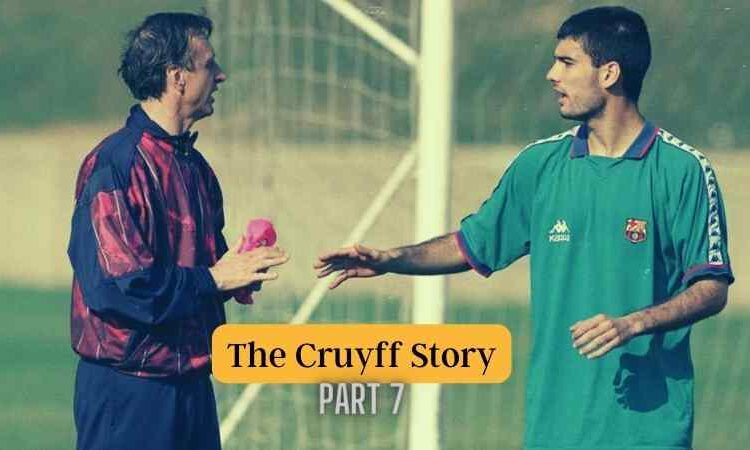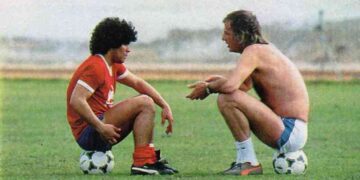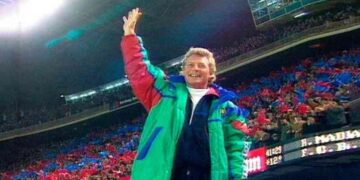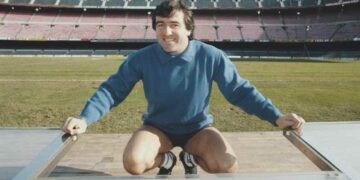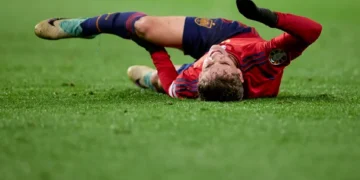Rarely has the man who could think three or four moves ahead been as surprised as in September 1987, when Frank Rijkaard suddenly walked away angry at Ajax’s training. The coach/technical director of the brand new winner of the European Cup II looked at his player with open mouth. “It was a comment of which you make a hundred every day…”, Cruyff stammered.
From one moment to the next, his Rijkaard project came to an end. After the departure of Marco van Basten to AC Milan, Frenk had to establish himself in his eyes as the new leader of the group of players. That may not have been entirely in his nature, but with his help he would succeed, Cruyff was convinced of that. Playing football, Rijkaard was already an example for the rest.
Weeks later, after Rijkaard had turned up at Sporting Portugal, the icon still sounded upset. “There has been no Cruyff-Rijkaard conflict,” he told VI’s Leo Verheul. ‘I tackled Rijkaard, as I always have. There hasn’t been a fight either. Of course, I didn’t see this coming. I thought it would go in the better direction, because just a week earlier that hassle with PSV (about a double contract and a stereo tower which were offered to Rijkaard, ed.) had been solved. This case really surprised me completely. I still don’t know what exactly is going on.’
Sjaak Swart, Rijkaard’s talking point in those confusing days, provided some clarification. ‘Frank has trouble with the whole fuss, the glitter of being a star’, Mister Ajax explained. ‘He prefers to be anonymous, just wants to be one of the boys and not the man. He doesn’t feel like he’s that good at all. With Cruyff it clashed now. Johan wants to bring you to the top. It continues to insist on weaknesses. He is not a man of a pat on the back. He doesn’t give either. Frank can’t stand to be taken care of all the time. Another person then steps on such a trainer at a certain moment and spits his bile, but Frenk does not do that, he bottles everything up. Yes, and then suddenly everything comes out at once.’
This is Part 7 of #TheCruyffStory. Part 1, Part 2, Part 3, Part 4, Part 5, Part 6
Did Cruyff love his players? Pooh, for an answer to that question Cruyff had to dig into his brain for a few moments. Dig deep. “I don’t know,” he said at the time. “Love my wife and children. I take all the characters into account, but that doesn’t mean I’m nice to them. As far as playing football is concerned, I’m not nice to them at all.’
But, he swore, always in their interest – he only wanted to make Rijkaard better – and in that of the team. “The fact that you lose your father early means you have to do something extra. In the family, but also outside it. Defending yourself, standing up for others. I always had a reason to do something, but never with dishonest arguments. I never put my self-interest first when I make a decision. I’ve never been ashamed of a decision.’
Although: Cruyff once proclaimed that Gerald Vanenburg could never become the leader of Ajax, for a very special reason: his high voice. In a TV documentary by Andere Tijden Sport, he apologized for this in 2012. “That was one of the things I shouldn’t have said. You’re shortchanging someone and you don’t have to.’
A Tough Character to work with
Rijkaard, Vanenburg are by no means the only ones who collided with Cruyff. Even a paragon of professionalism like Dennis Bergkamp got into trouble with The Master. “If someone sacrifices two or three years of his life for money and prefers the money over the sporting part, then the right mentality is not there,” Cruyff said after Bergkamp’s switch from Ajax to Inter. “I was very surprised by him.”
He once called Pep Guardiola ‘slower than my grandmother’. Hristo Stoichkov was constantly at odds with Cruyff, ‘who could break me down to the ground right in front of the group’. Michael Laudrup even went to Real Madrid out of grudge. And Ronald Koeman was also furious one day after he was once again not in starting eleven. Cruyff told him that he should not act like that and just come and have dinner with Danny and him that night. You keep work and private life separate, that was the hard lesson for the former and future national coach of the Dutch.
But for Rijkaard it was no longer so logical, as Cruyff always saw it, and could therefore no longer deal with it, a little more than half a year before the tournament of his life (EURO 88) in West Germany. He about his struggle to VI: ‘Silent Frank, I always told myself. But at some point, something snapped. I had a great time at Ajax, I also had a great time with Johan Cruyff. I don’t want to kick a dead horse, but it just didn’t click anymore.’
Distant views
Rijkaard wanted to make it clear what exactly he meant by that, to avoid misunderstandings. “I have nothing against the person Cruyff,” he explained, “no, certainly not, but against the coach. His approach to football and mine are diametrically opposed. He is looking for that field of tension… He constantly consciously sets groups against each other during the training. I just couldn’t, can’t and won’t afford that anymore.’
About 29 years later, the same Rijkaard gave perhaps the most beautiful salute to the recently deceased legend Cruyff. He told at the Sports Gala in December 2016 about a forest run from their time together as a player of Ajax. About secretly cutting off the route in the Amsterdam forest, following an unsuspecting Cruyff and the horrified look when Rijkaard accidentally stood on a branch. And then Cruyff surprisingly said: ‘Follow me, I know a short cut.’ “I’ll never forget it.”
Yes, he had lost a dear friend.
Family Matters the most
Chantal, Susila and Jordi, the children, and Danny, in his own words the compass in his life, came in place one, two, three and four. In addition, Cruyff had his friends for life. They were also almost family.
“Lonely at the top, no,” he once said in an interview. ‘I still have friends and the nice thing is that they are the same friends from the past. It is the familiar circle: you come from a certain environment, you then end up in another environment, and when the circle is complete again you are back in your own environment with your own friends. All those others you meet along the way are no more than passengers. At first you looked up to them, later you look down on them because they are often counterfeited.’
The most important condition for a warm family bond, for a friendship, was for Cruyff loyalty. Once he had come to the conclusion that someone did not (or no longer) meet this requirement, he could be unrelenting.
No second chances for loyalty
For example with Charly Rexach. Few people with whom Cruyff had such a close relationship during his periods as a player and coach of Barcelona as with the former winger. Together with Tonny Bruins Slot they built the Dream Team. But when Cruyff was sacked in May 1996, on the eve of the penultimate game of the season, and Rexach did not tie his fate to that of his great friend but took an interim seat on the bench the next day, something broke at the icon. ‘I don’t speak to Charly Rexach anymore’, Cruyff said later. ‘I have no need for contact. It was a big surprise to me that he let himself be bought by the club. He turned out to be just a friend with words.’
“How could I have been so wrong? That is something that touched me enormously. While Danny has always said it. He warned me often enough that I should not sail so blindly on him. I thought: We are back to back. But for a few cents it had happened. Money is nice and nice, but of course there are a few things in life that are more important.’
Rexach, who had warm words for his former comrade-in-arms at the time of Cruyff’s death, was not an exception. Not only Rijkaard returned to the proverbial arms of Cruyff, with whom he put Barcelona back on the map in the zero years, also the aforementioned Laudrup, Koeman, Stoichkov and so many others will speak of him with admiration and gratitude until their own last breath. “Cruyff changed my life and that of many players with me,” said the Bulgarian star about the coach who gave him the last move towards the Ballon d’Or .
Pep as the natural successor
Guardiola learned a lot from the way Cruyff treated his players. Like it was family. “In the moment, the moment he seeks confrontation, you don’t understand that behavior,” the Manchester City coach once explained. “But that was the way he worked. He asked so much of you. But once you were there, once you were part of his team, he protected you. He pushes and pushes you, and then he gives confidence.’
Laudrup’s recollection of the Dream Team years: “We won everything there was to win. But what I enjoyed the most is the spirit that was in that team. We were really friends, the atmosphere in the dressing room was phenomenal.’
Bottom line
The dressing room. Where players can howl with each other with happiness and sadness, must be able to tell each other the truth. With those safe, impenetrable walls in which everyone can be completely themselves, imagine themselves among friends / family and is closed off from the angry outside world. Cruyff even kept the door closed to the all-powerful Barcelona president Josep Lluís Núñez and his entourage.
As far as Cruyff was concerned, the entire top football remained free of such types, who sit there for the greater honor and glory of themselves and certainly do not act in the interest of the sport. Who also understand little about the game and the footballers, who have never experienced the pressure of having to perform, have no idea what is going on in a dressing room.
No, football belongs to the footballers, as he repeated many times. If it already smells like the dressing room at the top of the club, you have the same backing of your buddies there, your family feels like ever on the pitch, then it should be fine. At least that was Cruyff’s idea. No one understands a footballer better than a footballer.
Discover more from Barça Buzz
Subscribe to get the latest posts sent to your email.

